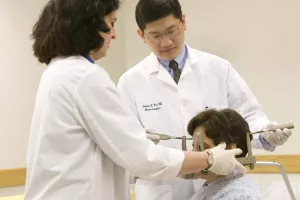Gamma Knife surgery is a safe, painless way to perform brain, head and neck surgery without making any incisions. Instead, it uses hyper-focused radiation to destroy harmful cells while sparing healthy ones. We’re proud to be among the few health systems in greater Boston to offer this life-changing procedure.
What is Gamma Knife surgery?
Treating the brain, head and neck area requires the utmost care. With all the nerves, blood vessels, vital organs and delicate structures nearby, performing traditional surgery here carries more risk than in other parts of the body. That's where Gamma Knife surgery comes in.
Despite the name, there’s no knife involved in Gamma Knife surgery, and we don’t make any incisions, either. Instead, we focus 192 beams of gamma radiation onto the area in need of care.
These beams pass harmlessly through nearby healthy tissue, which means less risk of infection and complications, little to no pain and shorter recovery times. In fact, most people can return to the activities they love in just a few days.

Conditions
Gamma Knife surgery is a smart treatment option for all kinds of tumors and abnormalities found in and around the brain, head and neck, including:
Treatments
You may be a good fit for Gamma Knife surgery if:
- The tumors are in hard-to-reach places, like the base of the skull
- Your doctor has deemed you too frail for traditional surgery
- Your tumors are small
We may also consider Gamma Knife surgery if you’ve tried traditional treatments like these and they haven’t had the intended effect:
- Chemotherapy
- Conventional neurosurgery to treat tumors
- Interventional neuroradiology
- Radiation therapy

From regular office visits to inpatient stays, find the healthcare you need and deserve close to home.

Meet the doctors and care team devoted to supporting you every step of the way along your path to better health.